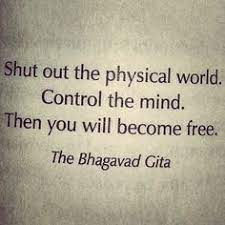Quote from the True charm and power of Vedanta
Thought on Vedanta
Man is like an infinite spring coiled up in a small box and that spring is trying to untold itself , and all the social phenomena that we see, the result of the trying ot unfold . all the competitions and struggles and evils that we see around us are neither the causes of these unfoldments nor the effects. As one of our great philosophers says- in the case of the irrigation of a field the tank is somewhere upon a higher level and the water is trying to rush into the field and is barred by a gate. But as soon as the gate is opened the water rushes in by its own nature: and if there is dust and dirt in the way, the water rolls over them. But dust and dirt are neither the result nor the cause of the unfolding of the divine nature of man. They are co-existent circumstances and therefore can be remedied.
Now this idea claims the Vedanta is to be found in all religions, whether
in India or outside of it, only in some of them the idea is expressed through mythology
and in other through symbology . the Vedanta claims that there has not been one
religious inspiration, one manifestation of the divine man, however great but
it has been the expression of that infinite oneness in human nature and all
that we call ethics and morality and doing good to others is also but that manifestation
of this oneness. There are moments when every man feels that he is one with the
universe, and he rushes forth to express it, whether he knows it or not. This
expression of oneness is what we call love and sympathy and it is the basis of all
our ethics and morality. This summed up in the Vedanta philosophy by the celebrated
aphorism Tat Tvam asi “Thou Art That”
Hinduism is a marvellously liberal philosophy
By Namita Devidayal
Imagine having an embarrassing uncle who shares your surname and does routinely awful things in public. No matter how hard you try to distance yourself, a part of your identity gradually gets compromised. This is how one feels, as a Hindu, these days. Certain ‘uncle-jis’ have literally hijacked and distorted what is a marvellously liberal and sophisticated philosophy in its essence, even if not always in practice.
Hinduism was once India’s biggest soft power, attracting hordes from
across the world who were seeking respite from their own depressed and divisive
cultures. The land of Karma Cola attracted some of the world’s greatest minds –
from Aldous Huxley who prefaced The Gospel of Ramakrishna to Richard Alpert who
became Ram Dass and catalysed a massive movement; from Ralph Waldo Emerson who
wrote Brahma to Somerset Maugham, who sat transfixed in Ramana Maharshi’s
ashram … People turned to India for answers.
The essence of Hindu philosophy can be found in the Upanishads, a series of dialogues which came at the end of the Vedas and are, therefore, called ‘Vedanta’. The Upanishads reflect the teachings in the Bhagwad Gita and both are filled with magic realism and wisdom. This edifying body of literature offers an approach to the self and one’s relationship with the universe that is radically different from what the modern world feeds us. Yet, these are astonishingly contemporary ideas that can be applied to environmentalism, psychology and quantum physics.
For instance, they align one to the idea of enlightened self-interest
based on an understanding that nothing is outside the self, but the self is
indeed the whole. ‘I am that’. Just as a wave is both an individual wave, with
its particular shape or life span, it is not separate from the ocean. We live in
an incredibly interconnected world. So, when you harm another – whether it is a
human being or a river or a nation – you are essentially harming yourself. If
not now, then for your great-grandchildren to forbear.
Modern physics clearly endorses that perceived objects are not what you
think they are. They can be broken down into particles and, eventually, energy.
So, our mindless obsession with the physical form – and with creating constant
divisiveness and hierarchy – is fallible. Today, fixed ideas about identity are
boring and dated, with even teenagers embracing gender fluidity.
But there may be an answer from within the very ‘Hindu’ ideology that its
alleged followers claim to protect – the karmic law of cause and effect.
Everything has a consequence. You plant a seed, it grows into a tree; you slay
the tree, you lose oxygen. If you inflict pain, there will be consequences – if
not immediately, then in the future. This holds true for individuals, for
societies, for nations. Whether it is physics, biology or psychology, universal
laws prevail. They have little to do with our God or anyone else’s God.
“If the red slayer think he slays/ Or if the slain think he is slain,/
They know not well the subtle ways/ I keep, and pass, and turn again.” – RW
Emerson
IF HE EXIST
I drive joy there was a doctor in
Benaras who spent 7 minutes in the morning and evening for mediation on God.
Knowing this, his colleagues and friends laughed at him. One day they argued
that he was wasting 7 precious minutes on something, which he had been misled
into believing. The doctor replied, “Well, if God does not exist, I agree that
I am wasting 7 minutes a day. But, if He exists? I am afraid you are wasting
your entire lifetime. I prefer to waste 7 minutes rather than a lifetime. Why
should you grudge me the 7minutes joy that I derive 4m.-
ILLUSTRATED REVIEW : 7th heaven moment of
the week @hardikpandya7 (4 wk in 7 over 71
runs )won motm , mots,











No comments:
Post a Comment